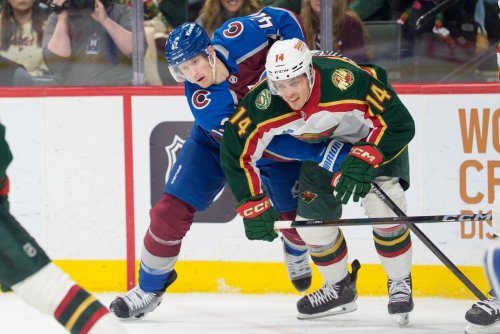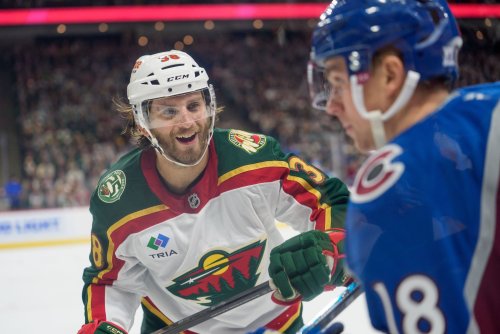.jpg.fbfcc82003820c663dc5816c349de9f4.jpg)
No matter what happens, Zeev Buium is already special. When he steps on the ice tonight for Game 1 of the Minnesota Wild's series against the Vegas Golden Knights, he'll be one of very few players to make their NHL debut in the playoffs. It'll be the first time anyone has done it in a Wild sweater.
It gets crazier. Buium will join Thomas Harley and Charlie McAvoy as the only defensemen to make their playoff debut within a year of their draft in the last 40 years. The last time that happened before McAvoy was back when 1984 draftee Bob Halkidis entered playoff games for the Buffalo Sabres in 1985.
This doesn't happen. And it especially doesn't happen in a front office regime that has been very careful with throwing young players into the fire for the Stanley Cup Playoffs. In 2021, the last time the Golden Knights squared off against the Wild, Matt Boldy was a Black Ace Minnesota didn't bother to put up their sleeve. He stayed on the bench as the Wild scored 13 goals in seven games.
Two years later, the Wild put Brock Faber into the playoffs after two games of regular-season experience. Still, they didn't add Marco Rossi after a dominant AHL season. This, despite Joel Eriksson Ek, who had broken his leg, playing a grand total of 19 seconds against the Dallas Stars. The Wild went to a Joe Pavelski/Roope Hintz/Tyler Seguin/Wyatt Johnston fight with Ryan Hartman, Freddy Gaudreau, and Sam Steel instead.
It's mind-blowing that Buium is drawing in for Game 1. There'd been hype surrounding the talented defenseman from Denver since draft day, but few thought Bill Guerin and John Hynes would hand him the keys to the power play to start a series without seeing him face NHL competition.
And with such little precedent for Buium, knowing what to expect is impossible. However, we have a few similar examples showing how the Wild might use Buium: Faber in 2023, Cale Makar in 2019, and McAvoy in 2017. Let's look at how those three were used during their playoff debuts.
Brock Faber, 2022 (vs. Dallas)
The first thing to mention is that Dean Evason was coaching this season, not Hynes. In addition, he also had two regular-season games to prepare him for the series. It's hard to draw any certain conclusions because of this, but it still feels instructive, given that Faber stepped into a similar lineup in a similar situation.
We remember Faber making a huge first impression in Game 1. Not only was he fourth among Wild defensemen in ice time (16:51), but he also made that incredible block in overtime to save the game, allowing Hartman to later put Minnesota up 1-0 in the series.
Still, Faber didn't jump into the series with both feet. Far from the 25-plus minute-muncher he became the next season, he averaged 14:33 over the series, and they heavily sheltered him. For one, he started 70.6% of his shifts in the offensive zone, with only Jon Merrill and John Klingberg being sheltered more.
Evason was also diligent about who Faber played against. Most of his minutes came against Ty Dellandrea, Mason Marchment, and Ty Dellandrea. Faber played only around 13 minutes against Jason Robertson and Hintz. Given that Faber's reputation as a defensive wizard is much stronger than Buium's, you can expect Hynes to similarly limit Buium to situations that set him up for success.
Cale Makar, 2019 (vs. Calgary Flames, San Jose Sharks)
As we just hinted at, Faber and Buium aren't a one-to-one comparison. Faber showed a lot more offensive punch than we thought, but Buium is at another level when it comes to puck-moving and scoring capability. To truly understand what Buium can do as a rookie debuting in the playoffs, we must turn to a player with a similar playstyle.
Makar's.
This is a stupid-unfair comparison, one that everyone should avoid at all costs. Makar has 51 goals over his past two seasons, the most by a defenseman in a two-year span since Brent Burns' heyday with the San Jose Sharks. Every hyped-up puck-moving defenseman will be compared to Makar, and that's a standard that Buium could fail to meet even if he turns into a Norris Trophy winner.
But in terms of offensive defensemen making their debut in the playoffs, damn, Makar's pretty much all we have to go on. Makar lost his NCAA Championship Game to Minnesota's true hockey powerhouse, the UMD Bulldogs, then stepped into Game 3 of the Colorado Avalanche's first-round series three days later.
Incredibly, the 20-year-old Makar was ready.
The Avs eased their star prospect into his first game, with just 14:19. But after that? They knew what they had. Makar logged 20:06 and 19:26 in Games 4 and 5, respectively.
Typically, you'd expect all that time to come on the power play. But no, Tyson Barrie spent more time running the Avs power play in all three games against the Flames, with Makar drawing in as the second-unit quarterback (during the rare times Nathan MacKinnon and Mikko Rantanen needed a spell). Instead, Makar was fifth among defensemen in 5-on-5 ice time in Game 5 (18:39 in an overtime game) and fourth in Game 6 (15:04).
The same trend was true in a high-stakes second-round series with the Sharks. Makar was fourth in 5-on-5 minutes for the series, while getting just under 11 power-play minutes to Barrie's 29.
None of this is to say that Makar got no help from his deployment. He led the team's defensemen in offensive zone start percentage (76.5%) for Colorado's playoff run. But he held his own, especially against a Sharks team that was still deep enough to get to the Western Conference Finals. Makar faced plenty of minutes against Erik Karlsson, Brent Burns, Timo Meier, Tomas Hertl, and even Joe Thornton.
The lesson here? Just because a rookie defenseman has an offensive reputation doesn't mean they can't be a two-way force. Makar held an 8-6 goals advantage while controlling 60.7% of the expected goals (per Natural Stat Trick's xG model). That can't be the expectation for Buium, who's a year younger than Makar was, but excelling at 5-on-5 is on the table.
Charlie McAvoy, 2017: vs. Ottawa Senators
How badly did the Boston Bruins need McAvoy to step into their playoff lineup? Zdeno Chara (172:34) was his only teammate with more minutes than McAvoy during their six-game series loss to Karlsson and Mark Stone's Senators. That's how injury-plagued Boston was at the time.
The Bruins absolutely worked McAvoy for every minute they could squeeze out of him. He averaged 26:12 through the series, which had four overtime games, with one going into double-OT.
Damn. And remember, McAvoy was in Buium's exact situation. They were drafted about 10 months before his NHL debut in the playoffs. No matter. McAvoy didn't just finish second on his team in 5-on-5 minutes; sans Torey Krug, the Bruins gave him the keys to the power play, leading the entire team in time on ice with the man advantage.
Did it work out for Boston? Ehhhhhh... McAvoy did his best in what has to be an unprecedented situation. However, he was underwater in goal share at 5-on-5 (three goals for, five against), and Boston's power play went just 3-for-16 (18.8%) for the series.
But McAvoy also proved his mettle in some big moments. His first career assist came on a 5-on-3 that Boston had to convert to force overtime in a pivotal Game 3. McAvoy stepped up to feed Pastrnak for the game-tying goal.
Then in Game 5, facing elimination in double overtime, McAvoy's point shot got deflected by Sean Kuraly to give the Bruins another game of life.
McAvoy offers two lessons to the Wild and its fanbase. The first is that you can't be afraid to let your star prospect get a shot in some big moments. McAvoy and Buium are in a unique position, but they were both there for a reason: their talent was so obvious at such a young age that their teams decided they could help in high-stakes games. For Hynes, he needs to trust that talent.
The second is that this is just the first step for Buium. McAvoy might not have quite had what it took to get Boston over the hump at 19. That turned out to be OK! Two years later, he brought Boston to the Stanley Cup Final. He's been a productive playoff producer for his entire career. He's widely considered one of the best all-around defensemen in the NHL.
That's why, no matter what, there's optimism for Buium just from being here. To be in this spot, you have to be special. Faber was special, and so was Makar, and so was McAvoy. It'll be fascinating to see what exact kind of special Buium becomes, but we know in this moment that tonight will be the start of something truly amazing.
Think you could write a story like this? Hockey Wilderness wants you to develop your voice, find an audience, and we'll pay you to do it. Just fill out this form.








Recommended Comments
Join the conversation
You can post now and register later. If you have an account, sign in now to post with your account.
Note: Your post will require moderator approval before it will be visible.